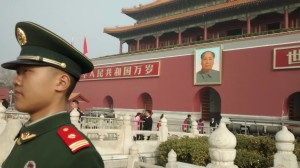China and Dissent
All my life, I’ve heard about the authoritarian Chinese government micromanaging every aspect of everyone’s lives, the government’s total control over career options, and of course, the “reeducation” of intellectuals and destruction of cultural resources during the Cultural Revolution. Getting a visa was a major and expensive hassle that had to be set up weeks ahead, and there was no way to get a business visa without an invitation from someone.
The other obvious difference was the way China blocks many key Internet sites, including all Google sites, Facebook, and Twitter. LinkedIn, Yahoo, and Bing do work, however.
And yet, during our brief visit, the society felt very open. While there are plenty of cops and security guards (including community volunteers who have almost identical uniforms to the police but with the addition of bright red armbands), most whom we saw were not obviously armed and seemed for the most part to be a force for peace, not repression. We’d often see cops joking around with passers-by or chatting amicably with each other. And mobility was almost totally unrestricted, other than at paid attractions. As visitors, we felt no police presence singling us out, had no “minders,” and we were unrestricted even when we went to meet a young couple that a friend of ours had met through Couchsurfing.
Even when our entire group of 26 struck up a conversation with a red-robed Tibetan monk (in the government’s eyes, a potential dissident) who happened to walk through Tiananmen Square with a stylish female companion, there was no feeling of being watched. Since I briefly had a Tibetan housemate and know how to say hello in Tibetan, I even greeted him in his own language. His face lit up—but he got frustrated and disappointed when he tried to answer back and realized that was the only Tibetan I knew. (China claims Tibet and has often considered organized Tibetan Buddhism a hostile force; the Tibetans see themselves as an occupied nation, and govern the religious aspects from exile in India.) He spoke fluent Chinese, so our tour director interpreted for us. He posed for selfies with all those in our group who wanted one and was with us for about ten minutes. Plenty of cops were on the plaza, and none took the least interest in this interchange.
I’ve seen photos of China in the 60s and 70s with Chairman Mao’s picture everywhere, providing a Big Brother is Watching motif. We saw exactly two pictures of Mao, other than on the 1 yuan bill: a giant portrait on Tiananmen Gate into Forbidden City,

and a modest poster in a random store window. We did not knowingly see a single picture of current Chairman Xi. Our tour director told us that the Cultural Revolution is definitely considered a mistake, and that the current government rates Mao “70 percent good and 30 percent bad.” He confirmed my suspicion that the prosecution of the “Gang of Four” (Mao’s widow and three comrades) a few years after Mao’s death was as much about repudiating Mao as anything else.
I noted only these very minor incidents:
- An officer on Tiananmen spun rapidly in an about-face when a tourist tried to take his picture; the cop Dina managed to catch in the picture shown here suspected he’d been photographed and glared at her, but made no attempt to engage.
- An annoying beggar outside the Shanghai Museum was told firmly to go elsewhere and leave our group alone.
- I was told to put my camera away after taking a photo of an ad inside a subway station—but I was not asked to delete the photo.
Street crime seemed to be nonexistent. The only threats I felt to my safety had to do with driving patterns, and particularly the very challenging lane-by-lane crawl across a completely uncontrolled eight-lane rotary to get between our hotel in Xian and the subway entrance one block away. Wasn’t too thrilled about silent electric mopeds sneaking up on both sides of what I’d thought was a one-way bike lane either.
Quite frankly, St. Petersburg, Russia, in 2002 (long after the collapse of the Soviet Union) as well as New York and Washington post-9/11 have felt far more invasive. It is, however, the first country I’ve ever visited that routinely x-rays all bags belonging to subway passengers before allowing them to board.
Our tour director, who had been at the Tiananmen demonstrations in 1989, even told us that when someone steps out of line on social media, all that happens is eventually the dissident’s account is closed. However, in the aftermath of 1989, friends of his were jailed.
Still, every resident of China we discussed it (a limited number) with felt oppressed by the government. One family we met with is actually arranging to relocate to Canada. So obviously, there’s more repression than meets the eye.
Shel Horowitz’s latest book, Guerrilla Marketing to Heal the World, shows how to turn hunger and poverty into sufficiency, war into peace, and catastrophic climate change into planetary balance—using the power of the profit motive.
